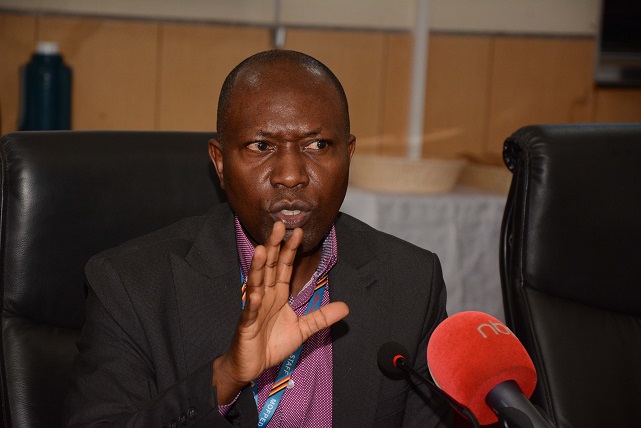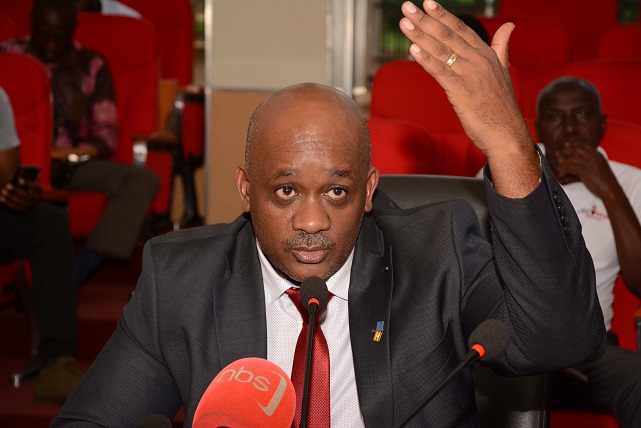Uganda’s domestic revenue envelop has widened, bringing Government’s intention to fully finance its development budget closer to reality.
Officials have disclosed that as at the end of September 2023, the cumulative domestic revenue collections for this financial year stood at sh6.327 trillion.
“This represented a 16.5% growth compared to the same period of the last financial year. The growth is higher than the average growth in revenue collections of 15% for the last three financial years,” said Ramathan Ggoobi, the permanent secretary, ministry of finance, planning and economic development.
This was during a press conference held at the ministry headquarters, last week, where he announced releases for the second quarter of FY 2023/24.
He said Government’s intention is to grow the domestic revenue collections by at least 0.5 percentage points of GDP for financial year 2023/24.
DEBT FALLS
Ggoobi, who is also the secretary to the treasury, said given Uganda’s fiscal consolidation strategy, public debt as a percentage of GDP has been reducing.
“Public debt to GDP ratio was projected to be 47.1% as of June 2023 which is a reduction from 48.4% at June 2022,” he said, adding: “Debt service obligations will reduce in the subsequent financial years, implying a reduction in the amount of our revenue used to service debt and thereby creating fiscal space to accommodate expenditure on more productive areas.”
LOWEST INFLATION
The PSST said Uganda has for several months now registered one of the lowest inflation rates in the region.
Inflation has continued to ease, with headline inflation declining to 2.7% in September 2023 from a peak of 10.7% in October 2022.
“This is on account of the reduction in fuel and some food prices, easing global supply chain constraints, the coordination of the fiscal and monetary policy undertaken by the government, and a stable exchange rate,” he said.
Ggoobi added that the September inflation rate was recorded at 2.7% from 10.7% in October last year, which enabled the economy to remain on a steady recovery path and is estimated to have grown by 5.3% in FY 2022/23.
This is higher than the 4.6% growth rate registered in FY 2021/22,” he said.
He attributed the growth to private sector investments in the key sectors of the economy including oil and gas and the continued implementation of government programs like the Parish Development Model (PDM), Emyooga, and Small Business Recovery Fund (SBRF).
“These have supported private sector activity, leading to higher output in agriculture, services and industry sectors.”
Ggoobi said with continued effective implementation of Government programs and private sector recovery, the economy is expected to expand by 6.0% this financial year (FY 2023/24).
“It is projected that aggregate demand and production will continue to recover mainly due to a continued decline in inflation, and increased activity in the oil and gas sector, which should boost employment as well as other sectors of the economy,” he said.

Uganda’s high-frequency indicators of economic activity show that there has been improvement in economic activity in the first quarter of financial year 2023/24.
“The Composite Index of Economic Activity (CIEA), which measures the volume of overall business activities, has been on an upward trajectory since April 2023, increasing to 162.63 in August 2023. This shows that business activity is growing,” he said.
He said similarly, the Purchasing Manager’s Index (PMI)1 prepared by Stanbic Bank also improved to 52.9 in September 2023 up from 51.6 in August 2023, pointing to an eleventh consecutive monthly improvement in the health of the private sector in Uganda.
FISCAL PERFORMANCE
Ggoobi said the government remains committed to maintaining fiscal sustainability, consistent with the requirements of the Charter for Fiscal Responsibility.
He said this will be realized through the implementation of the Government’s fiscal consolidation strategy that is hinged on increasing domestic revenue by at least 0.5 percentage points of GDP.
“This will be realised through implementation of the Domestic Revenue Mobilization Strategy and realigning expenditure from nonpriority to high-priority areas, as it reduces reliance on domestic and foreign borrowing





